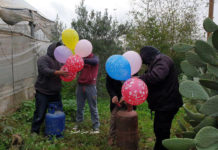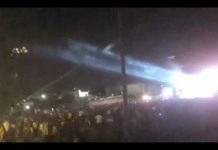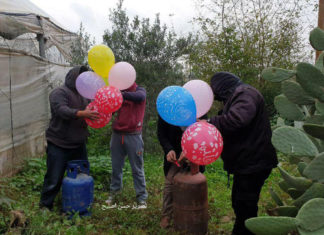“Homefront Command gave us their word that by the first of Sept., all students in the schools, classrooms and hallways, would be protected,” said Sderot Security Officer Judah ben Maman, as he showed Sderot Media Center reporters a school under construction.
However, Batia Katar, Chairman of the Sderot Parents Committee, said that is not the reality.
“Children can go to school, but I don’t think that they can study there safely because to this day, the schools have not changed in the past year,” she said. “There was no extra protection added. Nothing has been done.
“No school is Sderot is protected. The current protection is only good against [up to] 3kg of explosives.
Photo: Chen Schwartzman
“I told them, ‘God loves us, God helps us, and that is why nothing has happened yet, but if, God forbid, one Qassam would hit a protected building directly, you would see the missile would go through the roof and land in the middle of the room.”
Katar and ben Mamon also disagreed on the state of the bus-stop shelters Homefront Command has provided for Sderot.
“It provides shelter from shrapnel, but we are also protected from shrapnel in this room,” said Katar.
“Am I fooling myself? Aren’t we fooling these poor children telling them to go inside these shelters, when in the instance of a direct hit, nobody in there would survive?”
“If Homefront Command has decided to station these shelters in the city of Sderot, it probably means they provide a proper response to the current security threat,” ben Maman said. “We trust that the IDF and Homefront Command have placed the shelters for our protection.”
Josh Adler agrees with Katar.
Adler is the co-founder of Operation Lifeshield, an organization that raises money to build bomb shelters in places in Israel that exist under the threat of missile fire. He and his partner, Shep Alster started the operation after spending time in northern Israel during the Second Lebanon War when Hizbullah rained katyusha rockets on the region.
“It was a situation where there was no protection in public places,” Adler said. “Basically, if you’re out trying to live daily life, you are not safe.”
They saw the same problem in Sderot.
After Operation Lifeshield sent a number of shelters to Sderot, people began to see that the plan was a possible solution, at least to the lack of protection, so they started pressuring the government, which eventually adopted the concept, according to Adler. The bus-stop shelters are the result.
Adler, however, is not satisfied with the bus-stop shelters. Operation Lifeshield shelters feature a roof consisting of 30cm of concrete plus a layer of reinforced Flextech steel and 20cm-thick walls with a layer of reinforced steel, which equips them to withstand a direct hit from a Qassam or katyusha. The bus-stop shelters built by Homefront Command, however, feature only 20cm-thick roofs and cannot withstand a direct hit, according to Adler.
“It’s sad that the Israeli government promised people protection, and even with a strong economy and enough money, it is not fulfilling its duty to the best of its ability,” Adler said. “Unfortunately, non-profit organizations are essentially doing the government’s job. It’s nice when non-profits help the government, but they should not be a replacement. It’s sad.”
“If I were a parent in Sderot, I’d be very concerned,” he said of the upcoming school year. “I honestly wouldn’t know what to do.”










